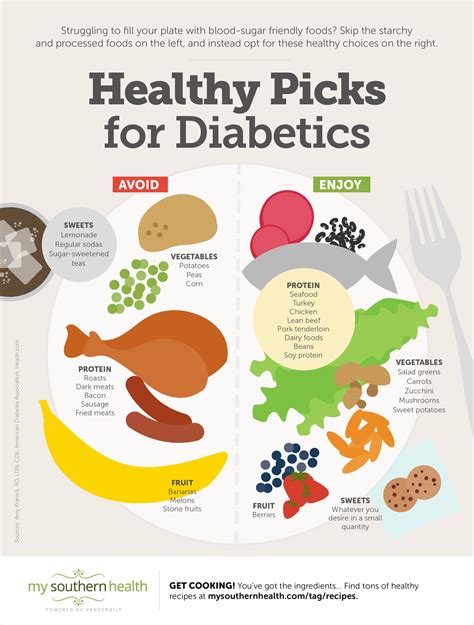Intro
Manage diabetes with 7 expert-approved diet tips, including healthy meal planning, carbohydrate control, and sugar management, to regulate blood sugar levels and improve overall health.
Living with diabetes requires a significant amount of planning and attention to detail, particularly when it comes to managing one's diet. A well-planned diabetic diet can help individuals with diabetes to maintain stable blood sugar levels, manage symptoms, and prevent complications. With the numerous dietary options available, it can be overwhelming to determine the best approach for managing diabetes through diet. However, with the right guidance and support, individuals with diabetes can develop a personalized diet plan that meets their unique needs and promotes overall health and well-being.
Effective diabetes management involves a multifaceted approach that incorporates a healthy diet, regular physical activity, and medication (if prescribed). A diabetic diet is not a one-size-fits-all solution; rather, it is a tailored plan that takes into account an individual's lifestyle, preferences, and nutritional needs. By understanding the importance of a well-planned diet and making informed food choices, individuals with diabetes can better manage their condition and reduce the risk of complications. In this article, we will delve into the world of diabetic diets, exploring the benefits, working mechanisms, and key considerations for developing a personalized diet plan.
The relationship between diet and diabetes is complex, and there is no single "diabetic diet" that works for everyone. However, there are certain principles and guidelines that can help individuals with diabetes make informed food choices and develop a healthy eating plan. By focusing on whole, unprocessed foods, such as vegetables, fruits, whole grains, lean proteins, and healthy fats, individuals with diabetes can promote stable blood sugar levels, support weight management, and reduce the risk of chronic diseases. In the following sections, we will explore the key components of a diabetic diet, including the benefits of various food groups, meal planning strategies, and tips for making healthy choices.
Dietary Principles for Diabetes Management

Carbohydrate Counting
Carbohydrate counting is a meal planning approach that involves tracking the amount of carbohydrates consumed at each meal and snack. This approach can help individuals with diabetes to better manage their blood sugar levels, as carbohydrates have the greatest impact on blood glucose. By counting carbohydrates, individuals with diabetes can make informed choices about the types and amounts of carbohydrates to consume, taking into account factors such as glycemic index, fiber content, and portion size. Some examples of carbohydrate-rich foods include bread, pasta, rice, fruits, and vegetables.Benefits of a Diabetic Diet

Meal Planning Strategies
Meal planning is an essential component of a diabetic diet, as it helps individuals with diabetes to make informed choices about the types and amounts of foods to consume. Some effective meal planning strategies for diabetes management include: * Creating a meal plan: Develop a personalized meal plan that takes into account individual nutritional needs, lifestyle, and preferences. * Shopping for healthy foods: Focus on whole, unprocessed foods, such as vegetables, fruits, whole grains, lean proteins, and healthy fats. * Cooking at home: Prepare meals at home using healthy cooking methods, such as grilling, roasting, and steaming. * Eating regular meals: Eat regular meals and snacks to maintain stable blood sugar levels and support overall health.Tips for Making Healthy Choices

Practical Examples
Here are some practical examples of healthy meal and snack ideas for diabetes management: * Breakfast: Oatmeal with fruit and nuts, scrambled eggs with whole grain toast, or Greek yogurt with berries and honey. * Lunch: Grilled chicken breast with roasted vegetables, quinoa salad with lean turkey and avocado, or lentil soup with whole grain bread. * Snacks: Fresh fruit, carrot sticks with hummus, or a handful of nuts and seeds. * Dinner: Grilled salmon with roasted sweet potatoes and green beans, chicken stir-fry with brown rice and mixed vegetables, or vegetable curry with whole grain naan bread.Common Mistakes to Avoid

Statistics and Research
According to the American Diabetes Association, approximately 34 million adults in the United States have diabetes, and an additional 88 million adults have prediabetes. The Centers for Disease Control and Prevention (CDC) report that diabetes is the seventh leading cause of death in the United States, and that the total annual cost of diabetes in the United States is approximately $327 billion. Research has shown that a well-planned diabetic diet can help to reduce the risk of complications and improve quality of life for individuals with diabetes.Conclusion and Next Steps

What is the best diet for diabetes management?
+A well-planned diabetic diet that focuses on whole, unprocessed foods, such as vegetables, fruits, whole grains, lean proteins, and healthy fats, is the best approach for diabetes management.
How can I develop a personalized diet plan for diabetes management?
+To develop a personalized diet plan, consult with a registered dietitian or a healthcare provider to determine your individual nutritional needs and create a tailored meal plan.
What are some common mistakes to avoid when it comes to diabetic diets?
+Common mistakes to avoid include overconsumption of carbohydrates, inadequate hydration, skipping meals, and eating too much added sugar.
